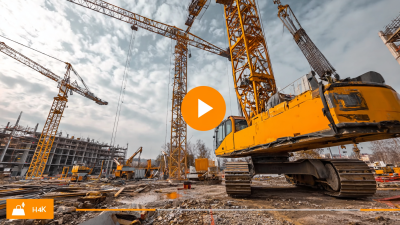7 Proven Best Practices for Effective General Contractor Services in 2023
In the dynamic world of construction and renovation, the importance of effective General Contractor Services cannot be overstated. As project demands evolve and new challenges arise, having a knowledgeable general contractor at the helm can make all the difference in ensuring timely and quality outcomes. This blog will explore seven proven best practices for general contractors in 2023, focusing on strategies that enhance communication, streamline project management, and bolster client satisfaction. Whether you're a seasoned professional or new to the field, understanding these key practices will provide valuable insights into how to navigate the complexities of modern construction projects effectively. Join us as we delve into the essential elements that define successful general contractor services this year.

Identifying Key Qualities of a Reliable General Contractor in 2023
 When looking for a reliable general contractor in 2023, it’s essential to identify key qualities that set the best apart from the rest. Firstly, strong communication skills are crucial. A contractor should be able to easily convey ideas, timelines, and potential issues to ensure that all parties remain on the same page throughout the project. This transparency fosters trust, which is imperative in any construction endeavor.
When looking for a reliable general contractor in 2023, it’s essential to identify key qualities that set the best apart from the rest. Firstly, strong communication skills are crucial. A contractor should be able to easily convey ideas, timelines, and potential issues to ensure that all parties remain on the same page throughout the project. This transparency fosters trust, which is imperative in any construction endeavor.
In addition to communication, experience and a robust portfolio play a significant role in establishing reliability. A seasoned contractor will have a track record of successfully completed projects, providing insights into their expertise. It's beneficial to seek out reviews and testimonials from previous clients to gain a better understanding of the contractor's work ethic and quality. Finally, the contractor's ability to adapt to challenges and find innovative solutions is a hallmark of a trustworthy partner. By focusing on these qualities, clients can ensure a smoother, more efficient construction process in the year ahead.
Understanding the Importance of Effective Communication in Construction Projects
Effective communication is crucial in construction projects, as it directly influences project outcomes, stakeholder satisfaction, and overall efficiency. As highlighted by industry experts, including renowned designers, the importance of clarity and transparency cannot be overstated. In the rapidly evolving construction landscape of 2023, builders and designers must establish robust communication frameworks that streamline collaboration between various parties, such as contractors, architects, and clients. This synergy is particularly vital in the realm of space design, where nuances in client expectations can significantly impact the final outcome.
Moreover, the complexities associated with construction often lead to misunderstandings that can result in delays and increased costs. Recent insights from professionals emphasize that well-structured communication strategies not only foster better relationships but also facilitate problem-solving and innovation. For instance, regular updates, feedback mechanisms, and open discussions can help preempt potential issues and enhance project quality. Ultimately, effective communication serves as the backbone of successful construction projects, ensuring that all stakeholders are aligned and that the final deliverables meet or exceed expectations.
Implementing Sustainable Practices for Eco-Friendly Contractor Services
In 2023, the construction industry is witnessing a significant shift towards sustainability, making eco-friendly practices a cornerstone of effective general contractor services. Implementing sustainable practices not only reduces the environmental impact of construction activities but also enhances the overall quality of projects. General contractors are now focusing on using environmentally friendly materials, such as recycled steel and sustainably sourced wood, which contribute to energy efficiency and reduce waste. By prioritizing green construction materials, contractors can ensure that their projects are both durable and responsible.
Furthermore, integrating energy-efficient technologies into construction processes is crucial. This includes the installation of solar panels, energy-efficient windows, and advanced HVAC systems that minimize energy consumption. These technologies not only lower operational costs for clients but also align with environmental regulations and standards. Additionally, contractors can engage in proper waste management practices, such as recycling construction debris and optimizing site layouts to minimize resource usage. By embracing these sustainable practices, general contractors can lead the way in shaping a greener future while meeting the increasing demands of environmentally conscious clients.
Enhancing Project Management Skills for Streamlined Execution
In 2023, enhancing project management skills is paramount for general contractors looking to streamline execution and improve efficiency. According to a report by the Construction Industry Institute, effective project management can lead to a 15% improvement in on-time project delivery and a 30% reduction in costs. These figures underscore the importance of adopting best practices in management to stay competitive in an increasingly complex industry.
One practical tip for general contractors is to implement robust communication strategies. Consistent and clear communication among project stakeholders can significantly decrease misunderstandings and delays. A study from McKinsey & Company found that better communication can enhance productivity by 20-25%. Tools such as project management software not only facilitate real-time updates but also centralize information, ensuring everyone is on the same page.
Another key practice is to invest in ongoing training for project management teams. According to a survey conducted by the Project Management Institute, 58% of organizations report a direct correlation between well-trained teams and successful project outcomes. Continuous education in new methodologies and technologies can help teams adapt to changing project demands, ultimately leading to more streamlined execution and greater project success.
7 Proven Best Practices for Effective General Contractor Services in 2023 - Enhancing Project Management Skills for Streamlined Execution
| Best Practice | Description | Benefits | Implementation Strategies |
|---|---|---|---|
| Clear Communication | Fostering open lines of communication among all stakeholders. | Reduces misunderstandings and accelerates decision-making. | Regular meetings, status updates, and collaboration platforms. |
| Budget Management | Keeping track of expenditures and managing costs effectively. | Ensures projects stay within budget, preventing financial overruns. | Utilizing financial software and regular budget reviews. |
| Time Management | Planning and adhering to schedules to optimize project timelines. | Increased efficiency and on-time project delivery. | Gantt charts and project management tools. |
| Risk Management | Identifying and mitigating potential risks throughout the project. | Reduces delays and additional costs caused by unforeseen issues. | Risk assessment workshops and contingency planning. |
| Quality Control | Ensuring that all work meets required standards and specifications. | Enhances client satisfaction and reduces rework. | Establishing quality benchmarks and regular inspections. |
| Technology Utilization | Adopting modern tools and software for project management. | Streamlines processes and enhances collaboration. | Investing in project management software and training. |
| Client Engagement | Involving clients throughout the project for feedback and input. | Improves client relations and project alignment with expectations. | Regular client check-ins and feedback sessions. |
Navigating Legal and Insurance Considerations for General Contractors
Navigating legal and insurance considerations is crucial for general contractors, especially in 2023, where regulatory environments continue to evolve. A report by the National Association of State Contractors Licensing Agencies highlighted that nearly 15% of all construction disputes arise from contract misunderstandings and non-compliance with local laws. Therefore, it’s essential for contractors to maintain a thorough understanding of zoning laws and safety regulations to minimize risks and avoid costly litigation.

In addition, adequate insurance coverage is pivotal in safeguarding against potential liabilities. According to the Insurance Information Institute, about 30% of small construction businesses lack sufficient liability insurance, which can lead to severe financial repercussions. General contractors must ensure they hold general liability insurance, workers' compensation, and, when necessary, professional liability insurance to protect both their business and their clients. By focusing on these legal and insurance considerations, contractors can not only comply with regulatory requirements but also enhance their reputation and trustworthiness in a competitive market.
Related Posts
-

Unlocking Success: Essential Tips for Choosing the Right General Contractor Services Globally
-

Unlocking Success: How to Choose the Best Construction Project with Essential Technical Specifications
-

7 Best General Construction Techniques You Should Know
-

Future Ready Construction Projects Essential Technology Trends and Actionable Checklist for 2025
-

Unveiling the Best General Construction Solutions Through Expert Comparison and Analysis
-

Unlocking Success in Best Construction Projects by 2025 Market Insights and Strategies
